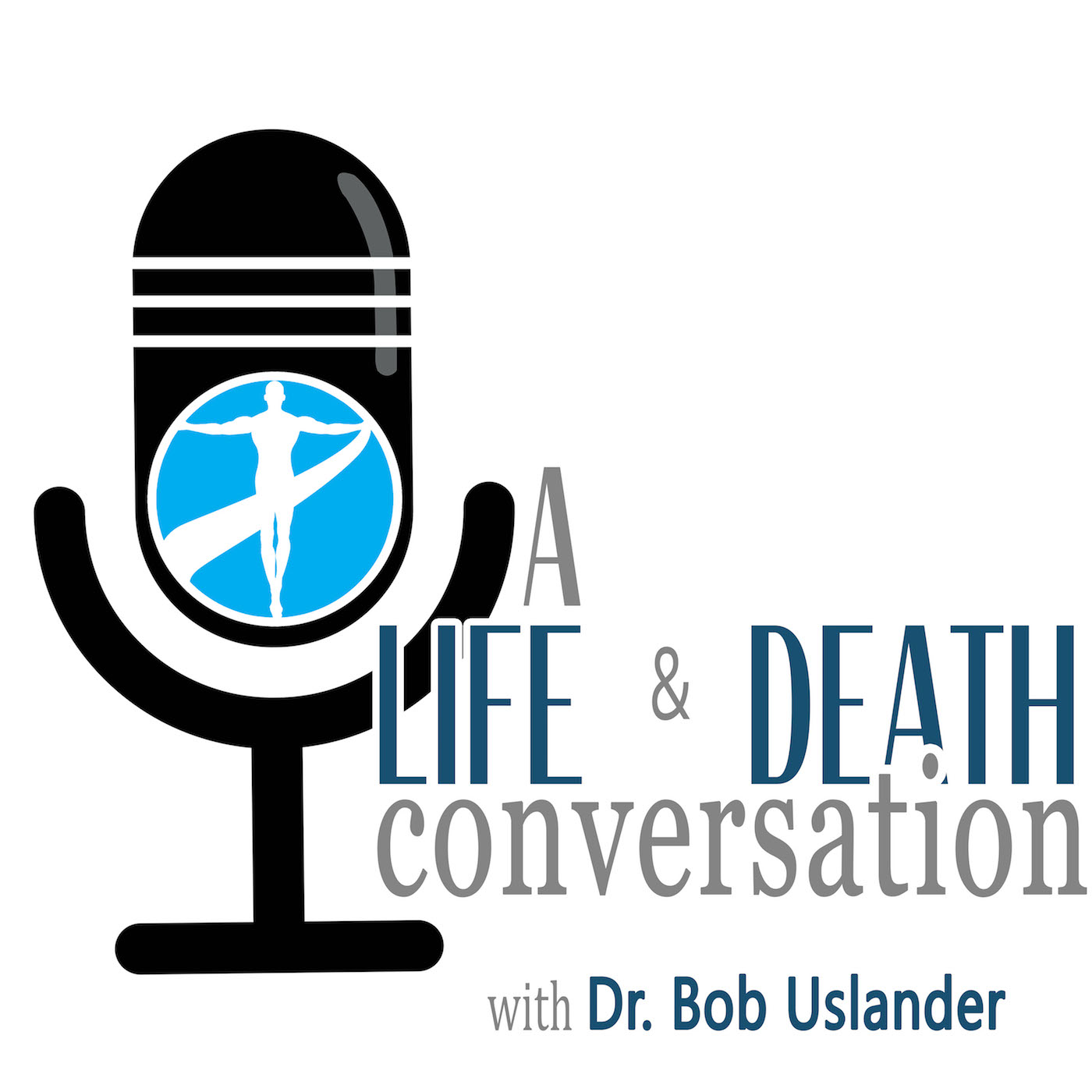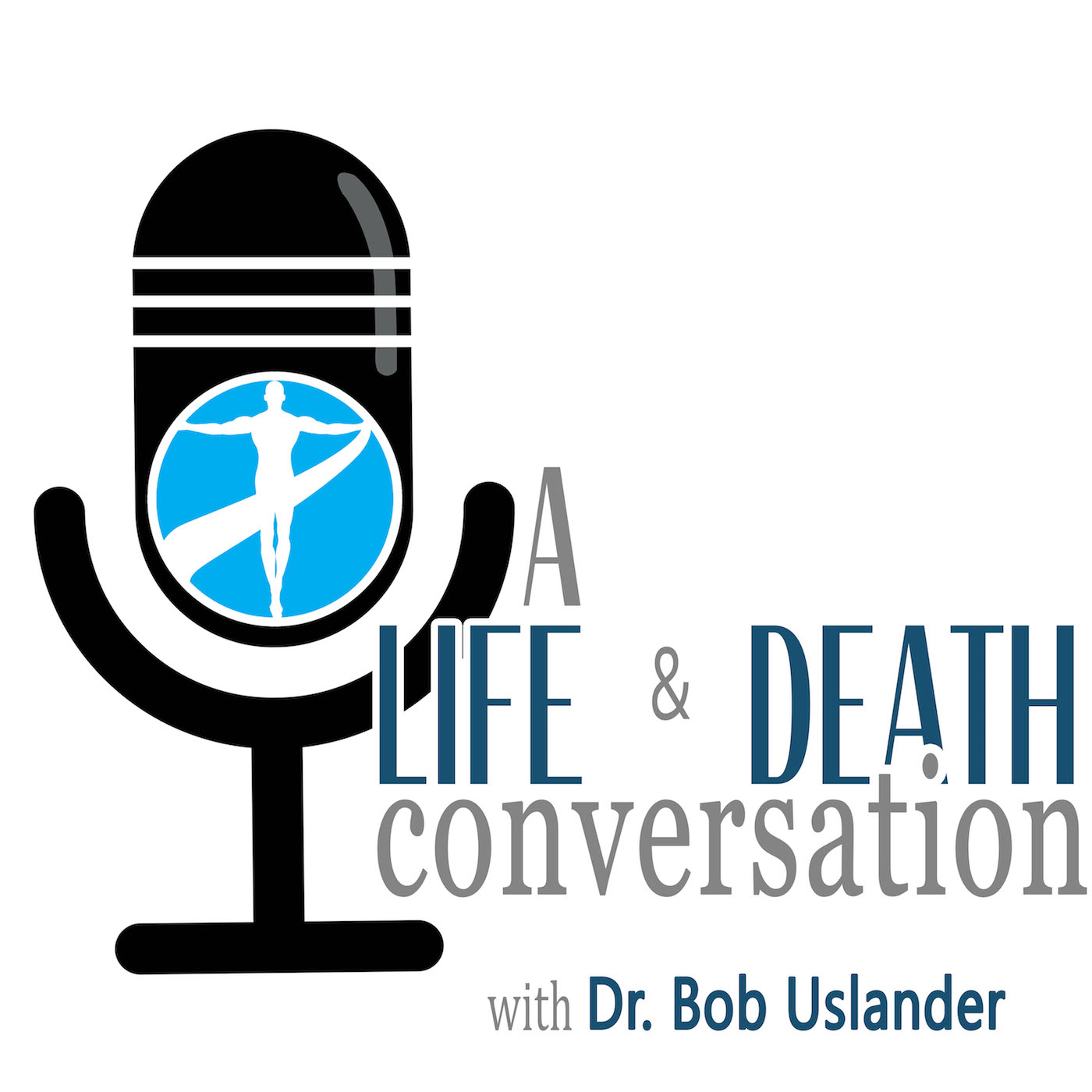How Self-Compassion Helps The Grieving Process, Lydia Lombardi Good Ep. 22
Update: 2018-07-09
Description
Lydia Lombardi Good is a licensed clinical social worker. She shares the importance of self-compassion, what it is, and how to get comfortable with it and how it helps the grieving process. Note: A Life and Death Conversation is produced for the ear. The optimal experience will come from listening to it. We provide the transcript as a way to easily navigate to a particular section and for those who would like to follow along using the text. We strongly encourage you to listen to the audio which allows you to hear the full emotional impact of the show. A combination of speech recognition software and human transcribers generates transcripts which may contain errors. The corresponding audio should be checked before quoting in print. Contact Lydia Lombardi Good, Pier View Counseling Transcript
How Self-Compassion Helps The Grieving Process
Dr. Bob: Yeah. That's my pleasure. This is a Life and Death Conversation, and we talk about things that we can do to enhance life and bring more joy and peace to life, and of course, we talk about death. We don't shy away from the topic of death. We always explore a bit about how our guests feel about the whole end of life, death and dying, what experiences they've had, how the awareness of death seems to show up in your life. For people who come on and have these conversations, most of the time they're pretty comfortable speaking about death and sharing their experiences and thoughts about it. I'm just going to open it up and let you share a little bit. I know that you do a lot of work in grief and loss, and you've been in hospice, and have a lot of experience. So share a little bit about what the idea of death and dying means to you, and how it shows up in your life. Lydia Lombardi Good: What I learned from my experience with death and dying, working with clients, having my own personal experience losing close loved ones, is the more we think about death and understand that it is inevitable, and we are all dying a little bit every day, I think the richer a life we are able to live, and we are more mindful of the choices we make, and the people we choose to surround ourselves with, and the life we want to live, knowing that nothing is permanent. Everything is impermanent. And if we live a life without regrets and can be more present to our lives instead of staying maybe stuck in the past, or focused too much on the future, we can look back and say, "You know, I fully experienced all that. I don't wish to be back there again. I wish to be right here, right now, to live my life fully," knowing that we really only have one shot at that. So that's how it's changed me a lot in terms of my own choices, the way I live my life, the way I try to stay compassionate. A lot of it's talked today, and what I really am passionate about is teaching people to embody self-compassion and treat yourself kindly, the way you would treat a close friend. And the more we can do that, the better life we can have. The more chances we take, the more we can just fix up things as they are, instead of always wishing things to be another way, or for us to be another way. And when we do that, we're missing what's happening right now. Dr. Bob: Yeah. That's beautiful. And I think it's pretty common to hear people share that when they contemplate death, when they recognize, like you say, the impermanence of everything, it really allows us to stay more focused on what's happening right now, and feel gratitude, and just feel very present. I want to talk about the mindfulness, the self-compassion, and the mindfulness, because mindfulness meditation, self-compassion have figured prominently in my life and I've done my work there, I've gone through courses in mindfulness. And it's so interesting what you said, to treat yourself the way that you would treat a close friend. Do we do that? I mean, do we really do that? The stuff that we lay on ourselves, and the way that we diss ourselves, which is so common. Like, if we were doing that to a friend, would they stick around? Would we still- Lydia Lombardi Good: We wouldn't have any. Dr. Bob: We wouldn't have any friends. Share a little bit more about that, about how you came to that, what your journey has been to become a teacher of self-compassion and mindfulness. Lydia Lombardi Good: Yes. Yeah. So, I was working in hospice since about 2007, 2008. Right out of graduate school I started this work, and I think I understood it to the best of my knowledge. I'd had a lot of loss in my past, and a lot of trauma that I thought I had worked through and had done a lot of healing around and was in this work. And I think I had as much compassion for the experiences of my clients and patients as I could have at the time, for that point I was in my life where I was at and what experiences I had been a part of at that point. And then it was 2012; I lost my dad to cancer. He died of prostate cancer and endocrine cancer. So the three years prior to that, we were taking care of him, and it was a real aggressive form, so it was a really difficult dying process. So that following year I was in charge of settling what I call closing out someone's life. That process of closing up his home, preparing it for the next chapter, getting his belongings and setting up beneficiaries, that kind of thing, and doing my grief as best as I could, as much as I knew how at that time. And then, shortly before the one year anniversary, I got a call from the medical examiner's office that my uncle, who was one of my father's primary caregivers aside from myself, had taken his life. So then I embarked on that next journey. I was his only family here, so helping to then close out another person's life. And then two months later, I get a call. My husband's out of state at a bachelor party. And I get a call that he's had an accident and I need to fly out immediately to Arizona and be with him because he's had a traumatic brain injury. So I fly out there and spend 10 days in ICU with him until we were basically told that we need to consider letting him go because he was not going to recover at that point. So my real journey I think began there. I could make sense that my dad was in his late 70's, although for some that is still young, but he had lived a really full life. My uncle, I wasn't as close with. It was a different type of grief, but losing my own husband was a total ... knocked me off my feet. It was a total life-changer. So basically, learning about self-compassion and mindfulness started the year before, when my dad was going through his dying process, but really kicked into high gear after I lost my husband, simply for just survival. I was in survival mode- Dr. Bob: Yeah, self-preservation. Lydia Lombardi Good: ... trying to figure out, yeah, how do I survive all this. Three in a row, I'm totally alone, feeling like I'm totally alone. How do I keep going? How do I keep going? How do I make sense of ... if this can happen to my 32-year-old husband, what's going to happen to me? This feeling of just total lack of safety and security and anything that I once knew. So that's when things really, really kicked into high gear for me. And a couple of years later I ended up leaving hospice. I was working out as a bereavement manager, and I decided to start my own practice, focusing on grief and trauma. A lot of it because of all the work I did with amazing clinicians, and spiritual healers, and energy healers, and the amazing, amazing people that supported me through my past, inspired me so much that I felt I really needed to do this myself and work with individuals again, and step away from the program planning and go back to pure clinical work. And it's been amazing. Dr. Bob: I bet. Wow. And like many people, your journey has taken you someplace because of your own personal experience. I mean, you have the training, you have the structure of having worked in a company, but once you had your own personal experience and were down in the depths, and then figured out what you needed to do to survive, and then I'm assuming beyond surviving, starting to thrive again, you recognized that you needed to be in a position to share that on a deeper level. Lydia Lombardi Good: Yeah. It's been tremendously healing, although I didn't jump into it necessarily to do it for my own healing. I wanted to make sure that was taken care of on its own, so I wasn't coming to work with clients doing my own work. But feeling complete and on a really steady path with my own healing empowered me to know the tools that work for people, and to empower others to consider some of these healing modalities. And mindfulness and self-compassion were right up there. They were the primary methods for me in terms of my healing. A lot of people as what does that mean. When I heard, "Self-compassion," I frankly, four, five, or six years ago I never knew what that even meant. It's not a term a lot of people in western culture understand or use. So really learning what that meant, and practicing it for myself, so I could know how to show others to do that. Dr. Bob: So why don't you try to explain it and let people know, because there's probably a lot of people here who ... you know, the self-compassionate conjures up some images and some thoughts, but I think you could probably do a really good job of helping people see what it really is to learn self-compassion. Lydia Lombardi Good: Yeah. So, self-compassion defined more is bringing yourself to the same attitude and understanding that you would do for others, or a beloved friend. So asking, how can I care for and comfort myself at this moment, instead of judging and criticizing. How can I bring kindness and understanding, and patience, when I'm confronted with a personal feeling or loss, instead of beating myself up. And then honoring and accepting your humanness. And with grief,Comments
In Channel







